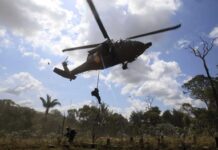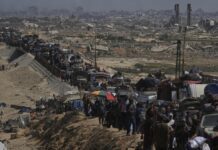
President Trump speaks during a media conference at the NATO summit in The Hague, Netherlands on June 25. Matthias Schrader/AP hide caption
toggle caption
Matthias Schrader/AP
President Trump used a press conference at the NATO summit Wednesday to expand on his insistence that U.S. strikes heavily damaged Iran’s nuclear operation, despite a preliminary U.S. intelligence report that suggested a more limited impact.
“It was very, very successful,” he told reporters. “It was called ‘obliteration.’ No other military on Earth could have done it.”
The press conference came as the world watches to see whether a ceasefire between Israel and Iran will endure. Citing that ceasefire, Trump compared his bombings to the nuclear bombs that helped end World War II.
“It was so bad that they ended the war. It ended the war,” he said. “Somebody said, in a certain way, that it was so devastating, actually, if you look at Hiroshima, if you look at Nagasaki, you know, that ended a war, too. This ended a war in a different way, but it was so devastating.”
Trump traveled to the summit the morning after announcing that ceasefire, which came days after the United States joined Israel’s attacks on key Iranian nuclear facilities. The early classified U.S. intelligence assessment said the set Tehran’s nuclear program back “a few months.”
Trump said he did not dispute the initial report’s assessment — but said it was only an early look at damage caused by U.S. strikes on three of Iran’s key nuclear facilities, including one called Fordo, built inside a mountain. At the press conference, Trump slammed U.S. news outlets, specifically naming CNN and the New York Times, for their reporting on it. He also cited a statement from the Israel Atomic Energy Commission, which said that U.S. strikes had “set back Iran’s ability to develop nuclear weapons by many years.”
At NATO, allies agreed to commit 5% of their GDP to defense spending by 2035, up from 2%. Trump has long called for allies to boost their spending, saying that the United States was paying more than its fair share. The U.S. contributes about 3.5% of its GDP to NATO.

Politics
Pentagon says Iranian nuclear capabilities are ‘devastated’ after U.S. strikes
Before the summit, Trump told reporters that the new goal wouldn’t apply to U.S. spending. “They’re in Europe. We’re not,” he said. And he also expressed some ambivalence to Article 5, the mutual defense clause in the NATO treaty that says an attack on one member is considered an attack on all, adding to long-held fears among European allies that Trump would not back them in the event of an attack.
At the press conference, Trump seemed to suggest the NATO summit had changed his thinking.
“I came here because it was something I’m supposed to be doing, but I left here a little bit different,” he said. He later added, “I left here saying that these people really love their countries. It’s not a ripoff, and we’re here to help them protect their country.”
Immediately prior to the press conference, Trump met with Ukrainian President Volodymyr Zelenskyy. Trump said they did not discuss a ceasefire in that country’s war with Russia.
“I just, I wanted to know how he’s doing. He was very nice, actually,” Trump said. “I took from the meeting that he’d like to see it end. I think it’s a great time to end it. I’m going to speak to Vladimir Putin, see if we can get it ended.”
He later added that he has not been able to end that war yet, in part because Putin is being “difficult.”
When asked why he and Zelenskyy did not talk to the press after their meeting, however, Trump did not answer, directing Defense Secretary Pete Hegseth to the lectern. He did not directly answer, either, instead excoriating the media for their reporting on the Iran intelligence assessment, calling it “spin” aimed at hurting Trump. “They want to spin it to try to make him look bad based on a leak,” Hegseth said.
“If you want to make an assessment of what happened, you better get a big shovel and go really deep, because Iran’s nuclear program is obliterated, and somebody, somewhere is trying to leak something to say, ‘Oh, with low confidence, we think maybe it’s moderate.’ “












